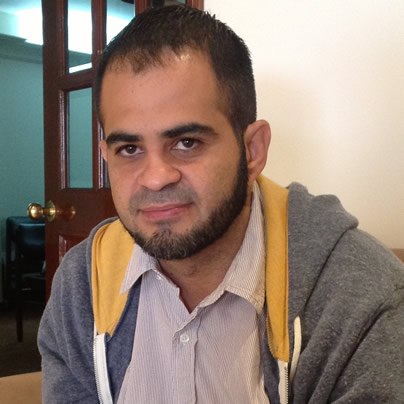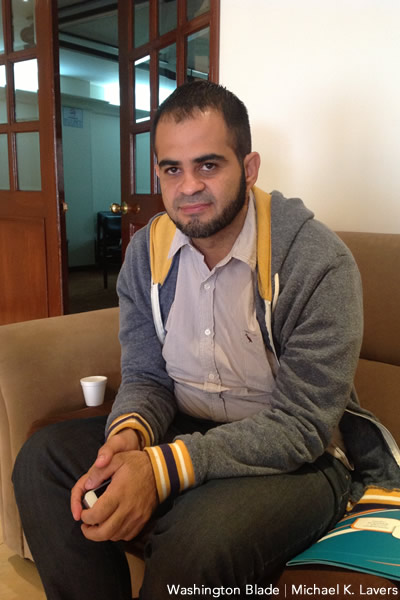News
Organization for American States backs anti-discrimination resolution
Advocates applaud inclusion of LGBT-specific language


Wilson Castañeda of the Colombian LBGT advocacy group Caribe Afirmativo. attended the OAS meeting in Guatemala. (Washington Blade photo by Michael K. Lavers)
The Organization of American States on June 5 adopted an anti-discrimination resolution that includes sexual orientation and gender identity and expression.
“Every human being is equal under the law and has the right to equal protection against all forms of discrimination and intolerance in whatever aspect of public or private life,” it reads.
The resolution the OAS adopted during its annual meeting that took place in Antigua, Guatemala, also said member countries have an obligation to prevent “all acts and demonstrations of discrimination and intolerance.” These include hate and bias-motivated violence and using the Internet and other media to incite “hate, discrimination and intolerance” against marginalized groups.
OAS delegates approved a second resolution that calls upon the organization’s 35 member countries to promote and protect the human rights of those living with or affected by HIV/AIDS. They also approved a third resolution that urged nations to stop discrimination based on race.
Anti-LGBT discrimination and especially violence remain serious problems in the hemisphere in spite of recent advances on same-sex marriage and other issues in countries that include Brazil and Uruguay.
A report that Colombia Diversa, a Colombian LGBT rights group, released last month indicates 58 of the reported 280 LGBT Colombians who were murdered between 2011-2012 were killed because of their sexual orientation or gender identity and expression. A separate report from the Latin American and Caribbean Network of Transgender Women (REDLACTRANS) notes 61 transgender women in Colombia have been reported murdered between 2005-2011.
The Jamaica Forum for Lesbians, All-Sexuals and Gays (J-FLAG) said at least 30 gay men have been murdered in the Caribbean country between 1997 and 2004.
The U.S. State Department has spoken out against anti-LGBT violence in Jamaica and other countries that include Honduras and Perú.
The Jamaica Supreme Court later this month is scheduled to hear the first domestic challenge to the island’s anti-sodomy law. The Belize Supreme Court last month heard a case that gay advocate Caleb Orozco filed against the former British colony’s statute that criminalizes consensual same-sex sexual acts between adults.
Trinidad and Tobago and Barbados are among the nine other English-speaking Caribbean countries in which anti-sodomy laws remain on the books.
Wilson Castañeda Castro, director of Caribe Afirmativo, a Colombian LGBT advocacy group that works in cities along the country’s Caribbean coast, attended the OAS meeting in Guatemala.
He told the Washington Blade earlier this week his group welcomes the anti-discrimination resolutions.
“This has been a triumph for the region’s LGBT and Afro-descendent movement,” Castañeda said.
Jaime Parada Hoyl, who became the first openly gay political candidate elected in Chile last October when he won a seat on the municipal council in a wealthy enclave in Santiago, the country’s capital, described the resolutions to the Blade as “historic.”

Maryland Gov. Wes Moore on Thursday signed a bill that seeks to combat efforts to ban books from state libraries.
House Bill 785, also known as the Freedom to Read Act, would establish a state policy “that local school systems operate their school library media programs consistent with certain standards; requiring each local school system to develop a policy and procedures to review objections to materials in a school library media program; prohibiting a county board of education from dismissing, demoting, suspending, disciplining, reassigning, transferring, or otherwise retaliating against certain school library media program personnel for performing their job duties consistent with certain standards.”
Moore on Thursday also signed House Bill 1386, which GLSEN notes will “develop guidelines for an anti-bias training program for school employees.”

The Mexican Senate on Thursday approved a bill that would ban so-called conversion therapy in the country.
Yaaj México, a Mexican LGBTQ rights group, on X noted the measure passed by a 77-4 vote margin with 15 abstentions. The Chamber of Deputies, the lower house of Mexico’s congress, approved the bill last month that, among other things, would subject conversion therapy practitioners to between two and six years in prison and fines.
The Senate on its X account described conversion therapy as “practices that have incentivized the violation of human rights of the LGBTTTIQ+ community.”
“The Senate moved (to) sanction therapies that impede or annul a person’s orientation or gender identity,” it said. “There are aggravating factors when the practices are done to minors, older adults and people with disabilities.”
Mexico City and the states of Oaxaca, Quintana Roo, Jalisco and Sonora are among the Mexican jurisdictions that have banned the discredited practice.
The Senate in 2022 passed a conversion therapy ban bill, but the House of Deputies did not approve it. It is not immediately clear whether President Andrés Manuel López Obrador supports the ban.
Canada, Brazil, Belgium, Germany, France, and New Zealand are among the countries that ban conversion therapy. Virginia, California, and D.C. are among the U.S. jurisdictions that prohibit the practice for minors.
The White House
Four states to ignore new Title IX rules protecting transgender students
Biden administration last Friday released final regulations

BY ERIN REED | Last Friday, the Biden administration released its final Title IX rules, which include protections for LGBTQ students by clarifying that Title IX forbids discrimination based on sexual orientation and gender identity.
The rule change could have a significant impact as it would supersede bathroom bans and other discriminatory policies that have become increasingly common in Republican states within the U.S.
As of Thursday morning, however, officials in at least four states — Oklahoma, Louisiana, Florida, and South Carolina — have directed schools to ignore the regulations, potentially setting up a federal showdown that may ultimately end up in a protracted court battle in the lead-up to the 2024 elections.
Louisiana State Superintendent of Education Cade Brumley was the first to respond, decrying the fact that the new Title IX regulations could block teachers and other students from exercising what has been dubbed by some a “right to bully” transgender students by using their old names and pronouns intentionally.
Asserting that Title IX law does not protect trans and queer students, Brumley states that schools “should not alter policies or procedures at this time.” Critically, several courts have ruled that trans and queer students are protected by Title IX, including the 4th U.S. Circuit Court of Appeals in a recent case in West Virginia.
In South Carolina, Schools Supt. Ellen Weaver wrote in a letter that providing protections for trans and LGBTQ students under Title IX “would rescind 50 years of progress and equality of opportunity by putting girls and women at a disadvantage in the educational arena,” apparently leaving trans kids out of her definition of those who deserve progress and equality of opportunity.
She then directed schools to ignore the new directive while waiting for court challenges. While South Carolina does not have a bathroom ban or statewide “Don’t Say Gay or Trans” law, such bills continue to be proposed in the state.
Responding to the South Carolina letter, Chase Glenn of Alliance For Full Acceptance stated, “While Supt. Weaver may not personally support the rights of LGBTQ+ students, she has the responsibility as the top school leader in our state to ensure that all students have equal rights and protections, and a safe place to learn and be themselves. The flagrant disregard shown for the Title IX rule tells me that our superintendent unfortunately does not have the best interests of all students in mind.”
Florida Education Commissioner Manny Diaz also joined in instructing schools not to implement Title IX regulations. In a letter issued to area schools, Diaz stated that the new Title IX regulations were tantamount to “gaslighting the country into believing that biological sex no longer has any meaning.”
Governor Ron DeSantis approved of the letter and stated that Florida “will not comply.” Florida has notably been the site of some of the most viciously anti-queer and anti-trans legislation in recent history, including a “Don’t Say Gay or Trans” law that was used to force a trans female teacher to go by “Mr.”
State Education Supt. Ryan Walters of Oklahoma was the latest to echo similar sentiments. Walters has recently appointed the right-wing media figure Chaya Raichik of Libs of TikTok to an advisory role “to improve school safety,” and notably, Raichik has posed proudly with papers accusing her of instigating bomb threats with her incendiary posts about LGBTQ people in classrooms.
The Title IX policies have been universally applauded by large LGBTQ rights organizations in the U.S. Lambda Legal, a key figure in fighting anti-LGBTQ legislation nationwide, said that the regulations “clearly cover LGBTQ+ students, as well as survivors and pregnant and parenting students across race and gender identity.” The Human Rights Campaign also praised the rule, stating, “rule will be life-changing for so many LGBTQ+ youth and help ensure LGBTQ+ students can receive the same educational experience as their peers: Going to dances, safely using the restroom, and writing stories that tell the truth about their own lives.”
The rule is slated to go into effect Aug. 1, pending any legal challenges.
****************************************************************************

Erin Reed is a transgender woman (she/her pronouns) and researcher who tracks anti-LGBTQ+ legislation around the world and helps people become better advocates for their queer family, friends, colleagues, and community. Reed also is a social media consultant and public speaker.
******************************************************************************************
The preceding article was first published at Erin In The Morning and is republished with permission.
-

 District of Columbia3 days ago
District of Columbia3 days agoCatching up with the asexuals and aromantics of D.C.
-

 South America3 days ago
South America3 days agoArgentina government dismisses transgender public sector employees
-

 Maine4 days ago
Maine4 days agoMaine governor signs transgender, abortion sanctuary bill into law
-

 District of Columbia4 days ago
District of Columbia4 days agoBowser budget proposal calls for $5.25 million for 2025 World Pride










